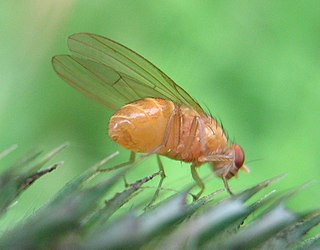
Biology – The natural science that studies life. Areas of focus include structure, function, growth, origin, evolution, distribution, and taxonomy.
Zoology is the branch of biology that studies the animal kingdom, including the structure, embryology, evolution, classification, habits, and distribution of all animals, both living and extinct, and how they interact with their ecosystems. The term is derived from Ancient Greek ζῷον, zōion ('animal'), and λόγος, logos.

Cold Spring Harbor Laboratory (CSHL) is a private, non-profit institution with research programs focusing on cancer, neuroscience, plant biology, genomics, and quantitative biology.
The Institute of Forest of the Siberian Division of the Russian Academy of Sciences is the first academic institution of a forest profile in Russia. It was founded in 1944 in Moscow by an outstanding native biologist academician Vladimir Nikolayevich Sukachev. The institute was named after him in 1967. In 1959 the Institute was assigned to the Siberian Division of the Academy of Sciences of the USSR and transferred to Krasnoyarsk.

The National Academy of Sciences of Ukraine is a self-governing state-funded organization in Ukraine that is the main center of development of science and technology by coordinating a system of research institutes in the country. It is the main research oriented organization along with the five other academies in Ukraine specialized in various scientific disciplines. NAS Ukraine consists of numerous departments, sections, research institutes, scientific centers and various other supporting scientific organizations.

A biologist is a scientist who conducts research in biology. Biologists are interested in studying life on Earth, whether it is an individual cell, a multicellular organism, or a community of interacting populations. They usually specialize in a particular branch of biology and have a specific research focus.
A biomedical scientist is a scientist trained in biology, particularly in the context of medical laboratory sciences or laboratory medicine. These scientists work to gain knowledge on the main principles of how the human body works and to find new ways to cure or treat disease by developing advanced diagnostic tools or new therapeutic strategies. The research of biomedical scientists is referred to as biomedical research.
The Max Planck Institute of Molecular Plant Physiology is a German research institute for molecular plant physiology, based in the Golm district of Potsdam, Brandenburg. Founded on 1 January 1994, the MPIMP focuses on the study of the dynamics of plant metabolism and how that relates to the entire plant system. The institution is one of the 80 institutes in the Max Planck Society (Max-Planck-Gesellschaft).

The College of Biological Sciences (CBS) is one of seven freshman-admitting colleges at the University of Minnesota, focused on research. Established in 1869 as the College of Sciences, the College of Biological Sciences is now located on both the Minneapolis Campus and the St. Paul Campus. The current dean is Valery E. Forbes.

The Carnegie Institution of Washington, known also for public purposes as the Carnegie Institution for Science (CIS), is an organization in the United States established to fund and perform scientific research. The institution is headquartered in Washington, D.C. As of June 30, 2020, the Institution's endowment was valued at $926.9 million. In 2018 the expenses for scientific programs and administration were $96.6 million. As of June 22, 2022, Eric Isaacs is president of the institution.
Kazakhstan Academy of Sciences is the highest scientific organization of the Republic of Kazakhstan. The Academy of Sciences was founded on 1 June 1946 on the basis of the Kazakh branch of the USSR Academy of Sciences. The central office is located in Almaty. It is a state institution that joins active members (academicians), corresponding members, and leading scientists of Kazakhstan.

The Institute of Physics (IOP) of the National Academy of Sciences of Ukraine founded in 1926 is the oldest research institution of physical science within the academy. Being on the path of both infrastructure development and research diversification for more than 80 years, the institute has eventually originated five more specialized research institutions.

Faculty of Biology of the Belarusian State University was founded in 1931. It is a major biology research and teaching establishment in the country, which includes nine Departments and nine Research Laboratories. The Dean is Vadim V. Demidchyk, Docent, Doctor of Sciences

Joanne Chory is an American plant biologist and geneticist. Chory is a professor and director of the Plant Molecular and Cellular Biology Laboratory, at the Salk Institute for Biological Studies and an investigator of the Howard Hughes Medical Institute.

The following outline is provided as an overview of and topical guide to evolution:
Asis Datta is an Indian biochemist, molecular biologist and genetic engineer, known for his research on genetically modified foods and food nutritional security. He was the founding Director of the National Institute of Plant Genome Research and is credited with the discovery of genes that assist in extended preservation of fruits and vegetables. He is a recipient of the Shanti Swarup Bhatnagar Award, the highest Indian award and in the Science category, and was awarded the fourth highest civilian award of the Padma Shri, by the Government of India, in 1999. In 2008, he was included again in the Republic Day Honours list for the third highest civilian honour of the Padma Bhushan.
Satish Chandra Maheshwari (1933-2019) was an Indian botanist and a former professor at the University of Delhi. He is known for his contributions to the fields of plant physiology and plant molecular biology. Maheshwari is an elected fellow of the Indian Academy of Sciences, the Indian National Science Academy and the National Academy of Sciences, India. The Council of Scientific and Industrial Research, the apex agency of the Government of India for scientific research, awarded him the Shanti Swarup Bhatnagar Prize for Science and Technology, one of the highest Indian science awards, in 1972, for his contributions to biological sciences. He died from lung cancer on June 12, 2019.

Ibrohim Yulchiyevich Abdurakhmonov — Uzbek statesman and scientist. From 2012 to 2017 Director of the Center for Genomics and Bioinformatics of the Academy of Sciences of the Republic of Uzbekistan. Currently Minister of Innovative Development of the Republic of Uzbekistan. Since 2012, he has been a member of the Executive Committee of the International Cotton Researchers Association (ICRA) and a member of the Board of the Higher Attestation Commission under the Cabinet of Ministers of the Republic of Uzbekistan. Member of the Academy of Sciences of Uzbekistan and the World Academy of Sciences.











